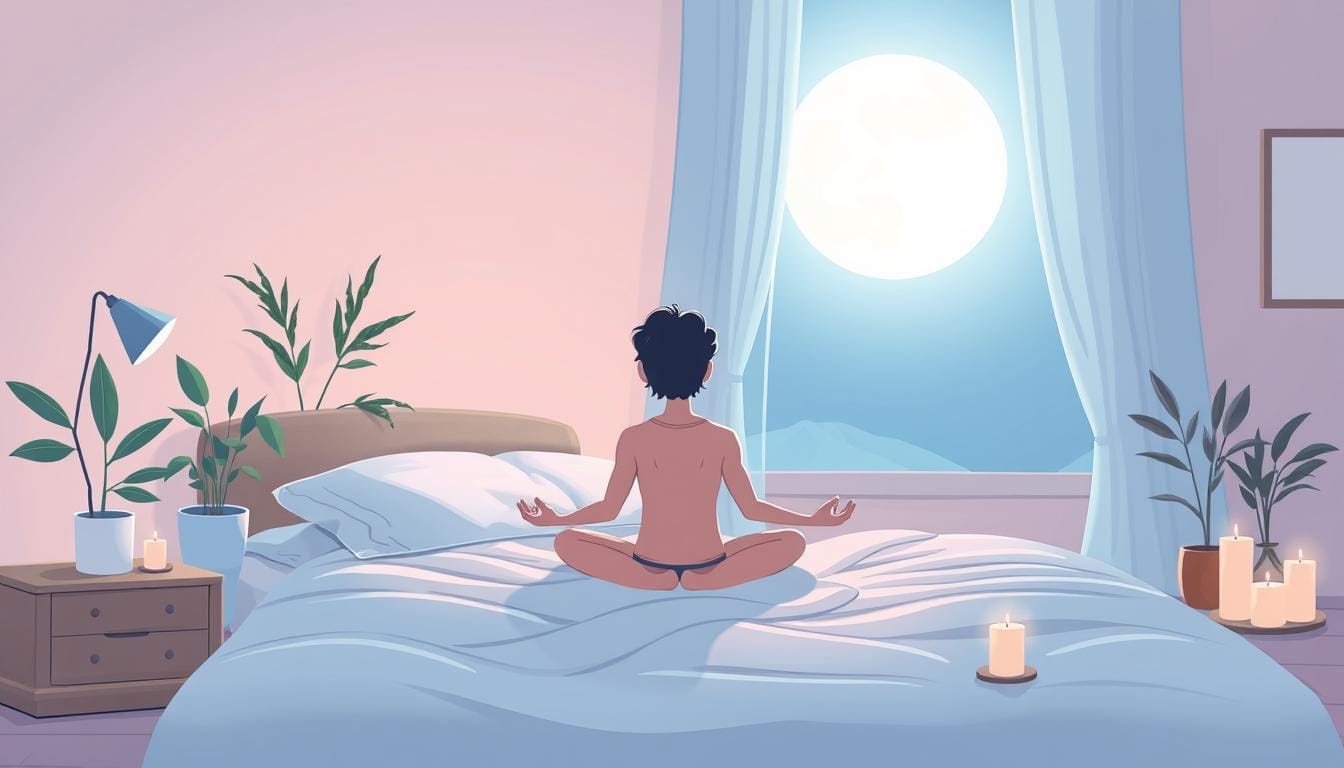Hello, sleepyheads and night owls! Today, let’s talk about something we all love but might not fully understand
Sleep. You’ve probably heard the famous saying: “Everyone needs 8 hours of sleep.”
But is this really true for all of us? As a sleep specialist, I’m here to give you the lowdown on this much-debated topic. Buckle up, and let’s dive into the world of dreams.
Table of Contents
ToggleThe 8 Hours of Sleep Rule Guideline: One Size Fits All?

The 8 hour sleep guideline is like the old pair of jeans in your closet: it fits many people well, but not everyone. Here’s the deal – while eight hours is a good average for most adults, it’s not a magic number that suits everyone. Like our taste in food or music, our need for sleep is personal.
Why 8 Hours?
The Magic Behind the Number 8
The eight-hour sleep recommendation didn’t just pop up out of nowhere. Scientists and sleep experts have done a lot of research to figure this out. They’ve studied lots of people’s sleep patterns and looked at how different amounts of sleep affect their health and daily functioning.
Here’s What the Science Says:
- Brain Health: When you sleep, your brain gets busy cleaning out all the day’s waste and recharging for the next day. Studies show that around eight hours is often the sweet spot for your brain to do all its cleaning and recharging effectively.
- Body Repair: Sleep isn’t just good for your brain; it’s like a repair time for your whole body. Growth hormones are released during sleep, which help repair muscles and tissues. Again, eight hours gives your body a good amount of time to do its repair work.
- Memory and Learning: While you’re sleeping, your brain is also busy sorting and storing all the new things you learned during the day. Getting around eight hours of sleep helps make sure this process works well, so you can remember things better and learn more easily.
- Emotional Well-being: Sleep affects your mood big time. People who consistently get around eight hours of sleep tend to have better emotional balance and are less likely to feel depressed or anxious.
- Physical Health: Good sleep helps keep your heart healthy, reduces the risk of diabetes, keeps your immune system strong, and can even help with weight management. A lot of these health benefits are seen in people who get around seven to nine hours of sleep, with eight hours often being the sweet spot.
But Remember, It’s a Guideline
While eight hours is a great general guideline based on all this science, it’s not a one-size-fits-all solution. Some people might need a bit more, and others might need less. It’s like how some people are perfectly happy with a small cup of coffee, while others need a giant mug to feel the same effect.
Understanding Your Body’s Sleep Needs
Figuring out how much sleep you need can be a bit like solving a mystery. Everyone’s different, so what works for your friend might not be right for you. Here are some clues to help you become a sleep detective and discover your perfect sleep amount:
Look for These Signs to Know If You’re Getting Enough Sleep:
Feeling Refreshed in the Morning: Do you wake up feeling like a superhero ready to tackle the day? That’s a big sign you’re getting enough sleep.
Staying Alert All Day: Can you get through the day without feeling like you’re walking through mud? If yes, then you’re probably sleeping enough.
Good Mood: Are you usually happy and not easily annoyed? Good sleep can keep your mood sunny!
Signs That You Might Need More Sleep

- Love for the Snooze Button: If hitting snooze is your morning exercise, you might need more sleep.
- Afternoon Slump: Do you feel super sleepy in the afternoon, like you could nap under your desk? Your body might be telling you it needs more sleep at night.
- Cranky Meter High: Feeling grumpy or getting upset easily can be a sign of not enough sleep.
How to Find Out How Much Sleep You Need
- Try Different Sleep Times: Experiment with different amounts of sleep – try 7 hours, then 8, then 9, and see how you feel.
- Keep a Sleep Diary: Write down how much you sleep each night and how you feel the next day. Look for patterns.
- Notice Your Energy Levels: Pay attention to how much energy you have. Feeling energetic all day might mean you’re getting the right amount of sleep.
- Listen to Your Body on Weekends: Without an alarm clock, how long do you sleep? This can be a big clue.
- Think About Your Health: Are you often sick? Getting enough sleep can help keep your immune system strong.
Remember, Sleep Quality Counts Too:
- A Comfy Bed: Make sure your bed is comfy and cozy.
- A Quiet, Dark Room: Keep your room dark and quiet for the best sleep.
- Wind Down Before Bed: Try to relax before bed, like reading a book or listening to calm music.
Factors That Affect Sleep Needs
Understanding how much sleep you need isn’t just about counting hours. Several factors can influence your sleep requirements. Here’s a breakdown of some key elements that might be affecting your sleep:
1. Age:
- Kids and Teens: Younger people need more sleep because their bodies and brains are growing and changing rapidly. Teenagers often need about 9 hours or more each night.
- Adults: Most adults do well with 7-9 hours, but this can vary.
- Older Adults: As we get older, our sleep patterns change, and we might need less sleep or find ourselves waking up earlier.
2. Lifestyle and Daily Activities:
- Active Lifestyle: If you’re super active or do lots of sports, your body might need more sleep to repair muscles and recover.
- Busy Brain: If your day involves lots of thinking or problem-solving, your brain might need more sleep to rest and recharge.
- Stress Levels: High stress can make it harder to sleep well and might mean you need more sleep to recover.
3. Overall Health:
- Fighting Illness: When you’re sick, your body needs extra sleep to fight off whatever’s making you ill.
- Chronic Conditions: Some health conditions, like hypothyroidism or depression, can make you feel more tired and need more sleep.
- Medications: Certain medicines can affect how much sleep you need or how well you sleep.
4. Sleep Quality:
- Frequent Wake-Ups: If you wake up a lot at night, you’re not getting solid sleep, which might mean you need more time in bed to get enough good sleep.
- Snoring or Sleep Apnea: Problems like snoring or sleep apnea can mess with your sleep quality, making you feel tired even after a full night’s sleep.
5. Environmental Factors:
- Light Exposure: Too much light before bed, especially from screens, can mess with your sleep cycle.
- Noise and Comfort: A noisy environment or an uncomfortable bed can disrupt your sleep, meaning you might need more time to get enough rest.
6. Genetic Factors:
- Natural Sleep Patterns: Some people are naturally “short sleepers” or “long sleepers” because of their genes.
- Body Clock: Your natural circadian rhythm (body clock) can affect how much sleep you need. Some people are night owls, others are early birds.
7. Diet and Eating Habits:
- Caffeine and Sugar: Eating or drinking lots of caffeine or sugar, especially late in the day, can keep you awake.
- Heavy Meals: Eating big, heavy meals close to bedtime can make it hard to sleep comfortably.
Conclusion
So, is the eight-hour sleep rule a myth? Kind of. It’s a good average to aim for, but it’s not the be-all and end-all. Your perfect amount of sleep is like your fingerprint – unique to you. By paying attention to your body and experimenting a little, you can find your ideal sleep sweet spot. Here’s to good nights and even better mornings! Sweet dreams, everyone!

Dr Chandril Chugh
Dr.Chandril Chugh is a neurologist who trained and practiced in the USA for more than a decade. He is compassionate and caring and is most well known for being a patient listener and spending ample time with patients.
Related Blog Posts
Confusional Arousal: Symptoms and How to Manage It
April 25, 2025
The Impact of Smartphone Use on Sleep Patterns
April 25, 2025




